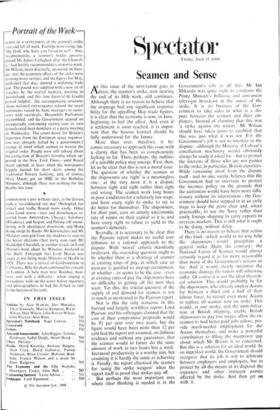Seamen and Sense
As this issue of the SPECTATOR goes to .n1press, the seamen's strike, now nearing the end of its fifth week, still continues. Although there is no reason to believe that the stoppage had any significant responsi- bility for the appalling May trade figures, it is clear that the economy is now, in June. beginning to feel the effect. And even if a settlement is soon reached, it is impor- tant that the lessons learned should be fully understood for the future.
More than ever, therefore, it be- comes necessary to approach this issue with a clarity that has been so conspicuously lacking so far. Then, perhaps, the outlines of a sensible policy may emerge. First, then, let us be clear that this is not a moral issue. The question of whether the seamen or the shipowners are 'right' is a meaningless one : at the very most it is a dispute between right and right rather than right and wrong. The seamen work long hours in poor conditions for a relatively low wage, and have every right to strike to try to do better for themselves. The shipowners, for their part, earn an utterly uneconomic rate of return on their capital as it is, and have every right to refuse to yield to the seamen's demands.
Secondly, it is necessary to be clear that the Pearson report makes no useful con- tribution to a rational approach to the dispute. With 'moral' criteria manifestly irrelevant, the overriding question ought to be whether there is a shortage of seamen at existing rates of pay, in which case an increase is justified to step-up recruitment. or whether—as seems to be the case—even at existing rates of pay the shipowners have no difficulty in getting all the men they want. Yet this, the crucial question of the supply of and demand for seamen, is not so much as mentioned in the Pearson report.
Nor is this the only nonsense in this hurried and largely worthless report. Lord Pearson and his colleagues claimed that the cost of their compromise proposals would • be 9+ per cent over two years; but the figure would have been more than 12 per cent had the report not assumed, on dubious evidence and without any guarantees, that the seamen would in future do the same amount of -work in two hours less a week. Increased productivity is a worthy aim, but • assuming it is hardly the same as achieving it. Finally, the report chastised the seamen for 'using the strike weapon' when the report itself is proof that strikes pay off. But perhaps the most important area where clear thinking is needed is in the Government's role in all this. Mr Ian Mikardo was quite right to condemn the Prime Minister's bellicose and anti-union television broadcast at the outset of the strike. It is no business of the Gov- ernment to take sides in what is a dis- pute between the seamen and their em- ployers. Instead of claiming that this was `a strike against the nation.' Mr Wilson should have taken pains to establish that this was just what it was not. For the Government's job is not to interfere in the dispute—although the Ministry of Labour's conciliation machinery would obviously always be ready if asked for —but to protect the interests of those who are not parties to the strike; in particular. British exporters. - While remaining aloof from the dispute itself—and no one, surely, believes that the Government had to intervene to protect the incomes policy on the grounds that the settlement would have been more infla- tionary without its intervention—the Gov- ernment should have stepped in at an early stage to keep the ports clear and, where practicable, to use the Navy rather than costly foreign shipping to carry exports to overseas markets. This is still what it ought to be doing. without delay.
There is no reason to believe that action of this kind—which would in no way help the shipowners—would precipitate a general strike. Quite the contrary : the National Union of Seamen would almost certainly regard it as far more reasonable than many of the Government's actions so far. And it would clearly minimise the economic damage the nation will otherwise suffer. Of course it is not the ideal theoreti- cal solution. This would probably be for the shipowners, who already employ Asians for between a third and a half of their labour force, to recruit even more Asians to replace all seamen now on strike. This would, at one stroke, end the immobilisa- tion of British shipping. enable . British shipowners to pay low wages, allow the ex- seamen to find better-paid jobs ashore, pro- vide much-needed employment for the Asians themselves, and make a powerful contribution to filling the manpower gap about which Mr Brown is so concerned. But this is a solution for an ideal world. In an imperfect world. the Government should recognise that its job is not to _arbitrate between employers and employees, but to protect by all the means at its disposal the exporters and other innocent parties affected by the strike. And then get on with it






























 Previous page
Previous page